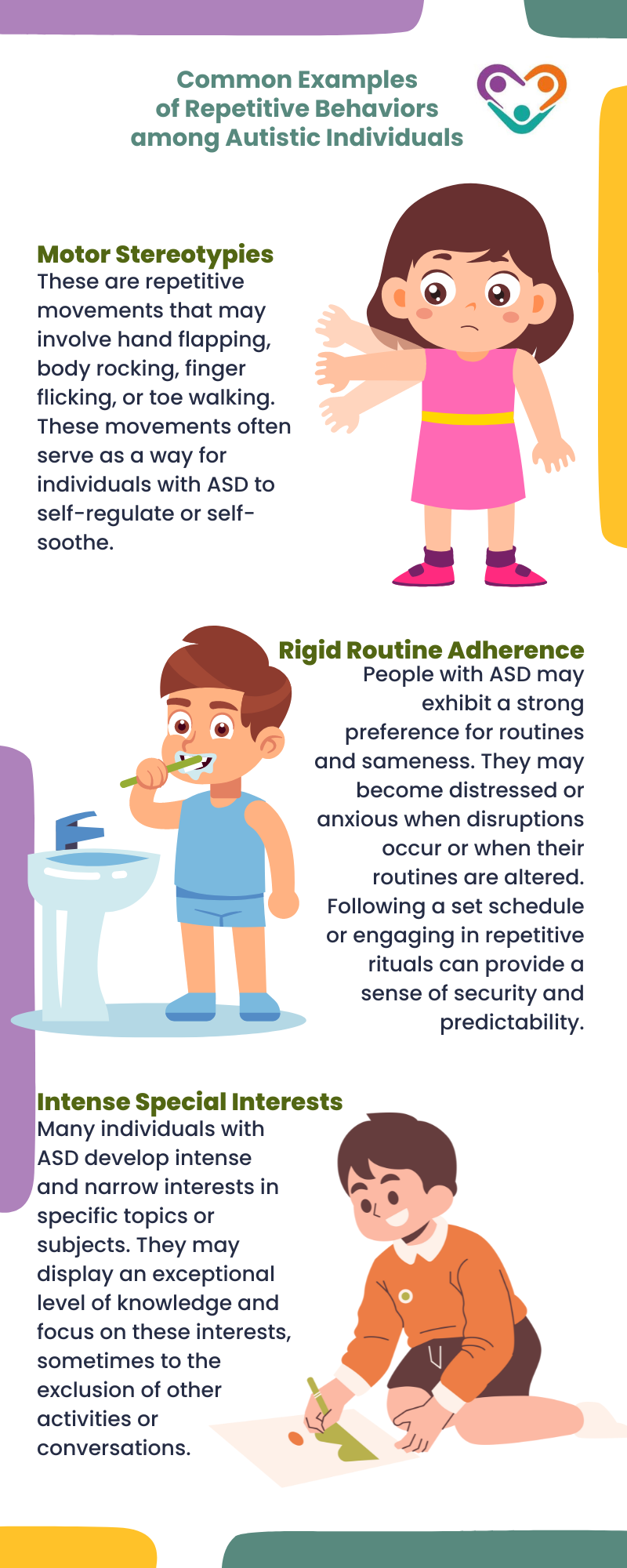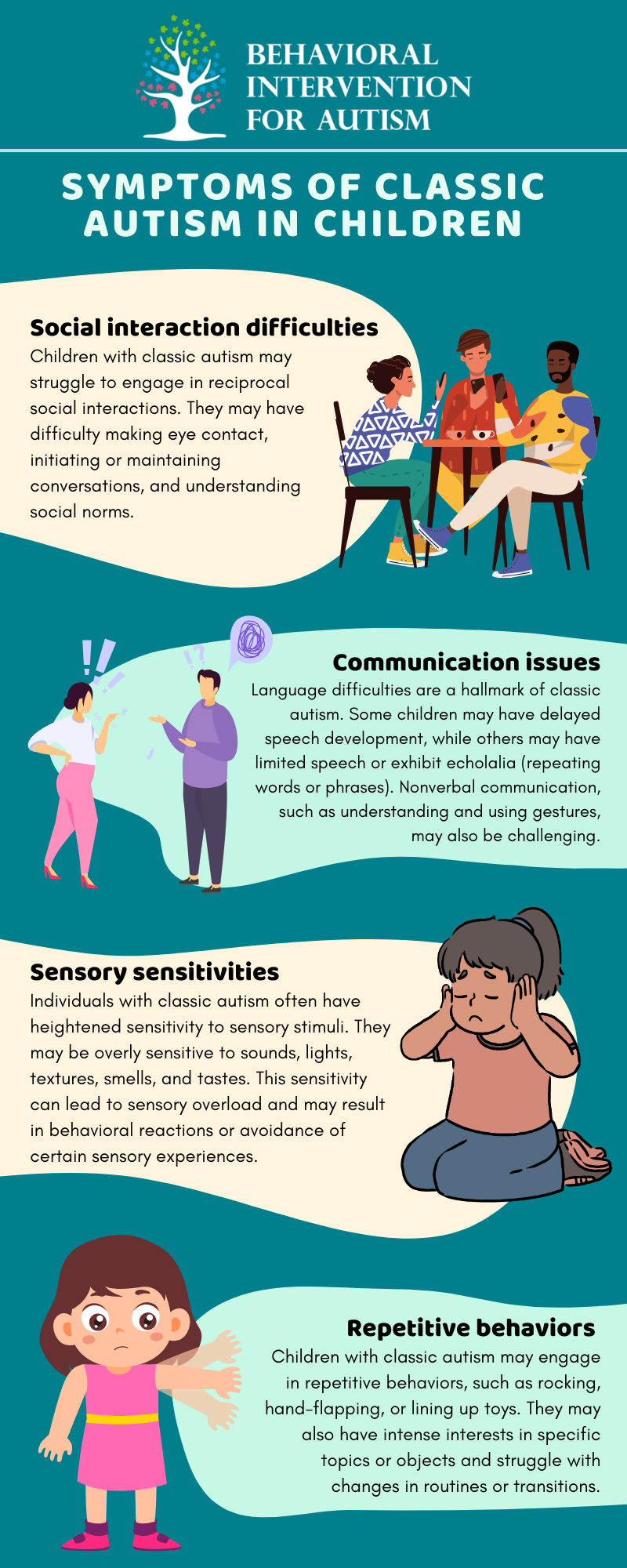Five practical strategies Autism Behavioral Therapy improve coping skills
Five practical strategies Autism Behavioral Therapy improve coping skills
Blog Article
Trick Symptoms And Signs to Acknowledge in People With Behavioral Autism
When you come across someone with behavior autism, recognizing key indications and signs and symptoms is crucial. Furthermore, sensory sensitivities can lead to overwhelming experiences.
Obstacles in Social Interactions
When you communicate with somebody on the autism spectrum, you may observe they have a hard time with social signs and interaction. These difficulties can make social interactions feel frustrating for them.
When they do involve, they could chat regarding their interests in terrific information without seeing if you're interested. Comprehending these difficulties can assist you approach interactions with empathy and patience, cultivating a more comfortable atmosphere for both of you.
Problem With Verbal and Non-Verbal Communication

Recognizing these signs is crucial, as it assists you much better assistance and engage with individuals on the autism range. By understanding their interaction obstacles, you can foster extra purposeful links and supply an extra helpful atmosphere.
Repeated Habits and Routines
Interaction challenges frequently go along with other indications of autism, such as repeated behaviors and a solid choice for routines. You could see that individuals with autism often take part in certain, repetitive actions, like hand-flapping, shaking, or duplicating expressions. These actions can provide comfort and a sense of control in a commonly frustrating world.
Regimens are similarly crucial; lots of people prosper when they follow an organized timetable. You may locate that modifications to these routines can lead to significant distress. For instance, if they have a day-to-day routine of consuming morning meal at a certain time or adhering to a certain route to institution, any disturbance can trigger anxiety.
Acknowledging these patterns helps you understand their behavior and offer support. By accommodating their need for regular and permitting recurring activities, you can produce a more comfortable atmosphere that alleviates their obstacles.
Sensory Sensitivities

Common Sensory Triggers
Sensory sensitivities can considerably influence day-to-day life for individuals with autism, as specific stimuli commonly activate overwhelming responses. Common sensory triggers consist of loud noises, brilliant lights, and strong smells. You may observe that abrupt sounds, like alarms or alarms, trigger stress and anxiety or distress. Fluorescent lighting in stores can really feel awkward and rough. Textures can also play a significant role; harsh textiles or certain food structures might be excruciating for you. Additionally, crowded areas can bewilder your detects, making it hard to concentrate or loosen up. Understanding these triggers can aid you manage your atmosphere much better. By knowing what impacts you, you can take steps to lessen discomfort and enhance your day-to-day experiences.
Behavior Responses Explained
Recognizing your behavior reactions to sensory sensitivities is crucial, as they commonly disclose just how you interact with the globe. You may discover that particular noises, lights, or textures overwhelm you, causing anxiousness or pain. When confronted with these stimuli, you may withdraw, cover your ears, or perhaps react aggressively. These responses aren't simply quirks; they're your means of coping with overstimulation. You might additionally find yourself looking for particular sensory experiences, like deep pressure or peaceful environments, to help ground yourself. Recognizing these patterns assists you understand your demands far better and can guide how you communicate them to others. By acknowledging your sensory level of sensitivities, you can work towards producing a setting that really feels much more comfortable and workable for you.
Coping Approaches Review
Recognizing your sensory level of sensitivities is just the first action; currently it's time to discover coping methods that can help you take care of those experiences successfully. Begin by creating a sensory toolkit tailored to your needs. Establishing an organized regimen can also offer predictability, lowering stress and anxiety around sensory overload.
Restricted Interests and Emphasis
While several people establish a vast array of rate of interests, those with autism commonly demonstrate limited rate of interests and an intense concentrate on certain subjects. You might observe that somebody with autism can spend hours delving into their favored subject, whether it's a certain kind of train, a details flick, or a clinical idea. This extreme emphasis isn't just a pastime; it can become a main component of their identity and social interactions.
You might find that discussions revolve around these passions, and they may struggle to engage in more comprehensive subjects. By comprehending and acknowledging these limited interests, you can cultivate an encouraging atmosphere where they feel valued and understood, permitting for even more meaningful connections and communications.
Emotional Law Troubles
People with autism frequently face obstacles in psychological guideline, which can be affected by their extreme emphasis on particular interests. You could notice that when a person is deeply involved in a favored activity, they can experience strong emotions, whether excitement or aggravation. When points don't go as planned., this strength often makes it tough for them to shift gears or manage their feelings - Autism Therapist.

Variability in Developing Milestones
When it concerns developmental milestones, you'll notice that people with autism typically reveal a large range of irregularity. Some may strike turning points promptly, while others may drag or development at a different rate. For circumstances, you could see a child succeed in language skills however fight with social interactions. This variance can be confusing, as typical benchmarks don't constantly apply.
It's necessary to identify that each individual's journey is distinct. Some may develop intricate abilities early, only to encounter challenges in the future. Others may take longer to accomplish basic milestones however more info here after that flourish in certain areas. Observing these patterns can assist you recognize their strengths and needs better.
Regularly Asked Questions
Just How Is Autism Diagnosed in Children and Grownups?
To diagnose autism in kids and grownups, experts review behavior, interaction skills, and social interactions. If a private satisfies the criteria for autism range disorder., they often make use of standard tests, interviews, and monitorings to figure out.
Exist Different Types of Autism Spectrum Disorders?
Yes, there are various kinds of autism range disorders, consisting of Asperger's disorder and prevalent developmental disorder-not otherwise specified. Each kind varies in intensity and attributes, so understanding these differences can assist you better support people with autism.
What Treatments Work for People With Autism?
When taking into consideration efficient treatments for people with autism, you'll locate options like Applied Habits Analysis, speech therapy, and work therapy. Each technique can assist boost interaction, social abilities, and day-to-day functioning tailored to individual needs.
Can Individuals With Autism Lead Independent Lives?
Yes, individuals with autism can lead independent lives. With the appropriate assistance, skills training, and resources, you can aid them develop self-sufficiency, manage day-to-day tasks, and prosper in different environments, fostering their freedom.
Just How Can Households Assistance Loved Ones With Autism?
You can sustain your enjoyed ones with autism by creating a structured atmosphere, motivating their interests, exercising persistence, fostering communication, and promoting social skills. Celebrate their accomplishments, despite how small, and build an encouraging area.
Although numerous individuals on the autism range can make use of and comprehend language, they typically encounter significant obstacles with both spoken and non-verbal interaction. Identifying these indications is important, as it assists you better assistance and engage with people on the autism spectrum. You could observe that people with autism usually involve hop over to here in specific, repetitive activities, like hand-flapping, shaking, or repeating expressions.Sensory level of sensitivities can significantly influence everyday life for people with autism, as particular stimulations typically set off frustrating responses.When it comes to developmental milestones, you'll discover that individuals with autism often reveal a vast variety of variability.
Report this page